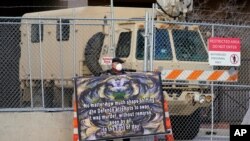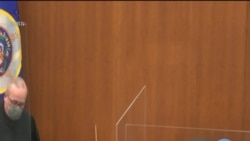Paramedics called to treat George Floyd after a police officer kneeled on his neck for more than nine minutes last year testified Thursday that they thought he was dead when they arrived.
Derek Smith, one of two paramedics who testified in a Minneapolis courtroom Thursday, said that when he arrived on the scene he could not find that Floyd had a pulse.
"In lay terms, I thought he was dead," Smith said.
Seth Bravinder, the second paramedic, told jurors Thursday that officer Derek Chauvin was kneeling on Floyd when they arrived.
"They were still on top of him," Bravinder said.
Chauvin kneeled on Floyd’s neck for nine minutes and 29 seconds as Floyd cried repeatedly that he could not breathe, igniting nationwide and global protests in support of Black lives and challenging the police system.
Chauvin, who is white, was fired by the city's police department the day after Floyd, an African American, died in custody.
Restraint 'could have ended'
David Pleoger, a now-retired Minneapolis police sergeant who was on duty the night Floyd died, told jurors Thursday he believed that Chauvin should have ended his restraint of Floyd earlier.
“When Mr. Floyd was no longer offering up any resistance to the officers, they could have ended the restraint,” Pleoger said.
Also Thursday, Floyd’s girlfriend tearfully described how she met him less than three years before his arrest in the Midwestern U.S. city of Minneapolis.
Courteney Ross’ testimony came on the fourth day of Chauvin’s trial.
Ross recalled the day she met Floyd at a Salvation Army shelter where he worked as a security officer and spoke with “this great Southern voice.” She also acknowledged they both grappled with opioid addiction.
“It’s a classic story of how many people get addicted to opioids. We both suffered from chronic pain. Mine was in my neck and his was in his back,” Ross said.
"We both had prescriptions," she said, but "we got addicted and tried really hard to break that addiction many times.”
Prosecutors appeared to be trying with her testimony to humanize Floyd and promote empathy among the jurors. Chauvin’s defense team is expected to stress that an autopsy found fentanyl and methamphetamine in Floyd’s system.
Body camera video
Late on Wednesday, jurors saw about 20 minutes of police body camera video that spanned the time from when police approached Floyd’s vehicle and when he was loaded into an ambulance.
Jurors thus far have also heard testimony from several witnesses, including the convenience store cashier who sold cigarettes to Floyd moments before his deadly encounter with Chauvin.
The former police officer is facing charges of murder and manslaughter and has pleaded not guilty.
Chauvin’s lawyers have argued he was following his training and that other factors such as heart disease and drug use caused Floyd’s death.
The city of Minneapolis recently agreed to pay Floyd’s relatives $27 million in damages to settle their claims of abuse in the case.







